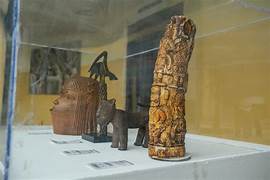
Netherlands Returns 119 Looted Sculptures to Nigeria

 :
| Updated On: 23-Jun-2025 @ 10:58 am
:
| Updated On: 23-Jun-2025 @ 10:58 amSHARE
The Netherlands has formally returned 119 ancient sculptures, collectively known as the Benin Bronzes, to Nigeria. These culturally and spiritually significant artefacts were looted over 120 years ago from the Kingdom of Benin, located in present-day southern Nigeria, during the colonial era. The official handover took place at a ceremony held at the National Museum in Lagos, where Nigeria's National Commission for Museums and Monuments Director-General, Olugbile Holloway, highlighted the importance of the return.
Holloway described the artefacts as “embodiments of the spirit and identity” of the Nigerian people from whom they were taken. He urged the international community to treat Nigeria with “fairness, dignity, and respect.” His comments reflect the broader calls for justice and restitution across Africa, where countries are increasingly demanding the return of cultural heritage objects taken during imperial and colonial periods.
The Benin Bronzes are a collection of metal and ivory sculptures, many dating from the 16th to 18th centuries, which originally decorated the royal palace of the Kingdom of Benin. These artefacts are renowned for their intricate craftsmanship and historical significance, serving as a testament to the artistic achievements and regal heritage of the Benin people.
The looting of the Benin Bronzes occurred in 1897 during a punitive expedition led by British forces under Sir Henry Rawson. The troops invaded the Kingdom of Benin, deposed its ruler Ovonramwen Nogbaisi, and exiled him for six months, while plundering thousands of cultural treasures. These items were then distributed across various museums and private collections in Europe and North America.
Of the 119 sculptures returned by the Netherlands, four will remain on public display in the courtyard of the National Museum in Lagos and become part of its permanent collection. The remaining artefacts will be handed over to the Oba of Benin, Ewuare II, the traditional monarch of the Benin Kingdom, acknowledging the cultural and historical ownership of the Benin royal family and its people.
This restitution by the Netherlands is part of a growing international movement to return looted African artefacts to their countries of origin. Germany, for instance, has also agreed to return over 1,000 Benin Bronzes to Nigeria, marking one of the largest repatriation efforts of its kind.
In recent years, Nigeria has intensified its efforts to reclaim its stolen heritage. In 2022, the Nigerian government formally requested the return of hundreds of cultural objects from museums across the world. That same year, 72 Benin artefacts were returned from a museum in London, and another 31 were repatriated from Rhode Island, USA.
The return of the Benin Bronzes is symbolic of a broader reckoning with colonial history and a growing acknowledgment by Western institutions of the injustices committed during imperial rule. It also represents a significant step toward restoring Nigeria’s cultural legacy and reinforcing the rightful ownership of its historical treasures. This trend of restitution is likely to continue, as African nations increasingly demand the return of their stolen heritage and Western museums face mounting pressure to respond ethically and responsibly.